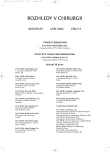-
Medical journals
- Career
Robotic Laparoscopic Cholecystectomy
Authors: D. Langer; J. Pudil; M. Ryska
Authors‘ workplace: Chirurgická klinika 2. LF UK a ÚVN Praha, přednosta: prof. MUDr. M. Ryska, CSc.
Published in: Rozhl. Chir., 2006, roč. 85, č. 9, s. 450-454.
Category: Monothematic special - Original
Overview
Introduction:
Laparoscopic approach profusely utilized in many surgical fields was enhanced by da Vinci robotic surgical system in range of surgery wards, imprimis in the United States today. There was multispecialized robotic centre program initiated in the Central Military Hospital in Prague in December 2005. Within the scope of implementing the da Vinci robotic system to clinical practice we executed robotic-assisted laparoscopic cholecystectomy.Methods:
We have accomplished elective laparoscopic cholecystectomy using the da Vinci robotic surgical system. Operating working group (two doctors, two scrub nurses) had completed certificated foreign training. Both of the surgeons have many years experience of laparoscopic cholecystectomy. Operator controlled instruments from the surgeon’s console, assistant placed clips on ends of cystic duct and cystic artery from auxiliary port after capnoperitoneum installation. We evacuated gallbladder in plastic bag from abdominal cavity in place of original paraumbilical port. We were exploiting three working arms in all our cases, holding surgical camera, electrocautery hook and Cadiere forceps. We had been observing procedure time, technical complications connected with robotic system, length of hospital stay and complication incidence rate.Results:
We managed to finish all operations in laparoscopic way. Group of our patients formed 11 male patients (35.5%) and 20 women (64.5%), mean aged 52.5 years in range of 27–77 years. The average operation procedure lasted 100 minutes, in the group of last 11 patients only 69 minutes. We recorded paraumbilical wound infections in 3 (9.7 %) patients. We had not experienced any technical problems with robotic surgical system. Length of hospital stay was 3 days.Conclusions:
Considering our initial experience with robotic lasparoscopic cholecystectomy we evaluate da Vinci robotic surgical system to be safe and sophisticated operating manipulator which however does not substitute the surgeon key-role of controlling position and decision competences. Presented results of our group are comparable to conclusions of abroad published works.Key words:
laparoscopic cholecystectomy – robotic surgery – da Vinci system
Labels
Surgery Orthopaedics Trauma surgery
Article was published inPerspectives in Surgery

2006 Issue 9-
All articles in this issue
- Intracranial Meningiomas; Standard Diagnostic Procedure and Results of Surgical Treatment
- Patient Selection for Surgical Treatment of Obesity
- Neurostimulation – Prevention of Injuries to the Nervus Laryngeus Recurrens During Thyreoidectomy
- Crossectomy – the Most Important Step in Varices Surgery
- Robotic Laparoscopic Cholecystectomy
- From Classical Open, Via Laparoscopic to a Robot-Assissted Laparoscopic Surgery
- Distribution of Metastatic Affection in Colorectal Carcinoma Using Lymphatic Mapping and Radiation-Navigated Biopsy of the Sentinel Lymphonode
- Preoperative Radiotherapy in Hypoxia in the Complex Treatment of the Rectal Carcinoma – Long Term Results
- Spontaneously Separated Gall Bladder as a Rare Cause of Intestinal Obstruction – A Case Review
- Splenosis in the Abdominal Wall Subcutis
- A Rare Cause of the Small Intestine Ileus
- Perspectives in Surgery
- Journal archive
- Current issue
- Online only
- About the journal
Most read in this issue- Crossectomy – the Most Important Step in Varices Surgery
- Neurostimulation – Prevention of Injuries to the Nervus Laryngeus Recurrens During Thyreoidectomy
- Robotic Laparoscopic Cholecystectomy
- Splenosis in the Abdominal Wall Subcutis
Login#ADS_BOTTOM_SCRIPTS#Forgotten passwordEnter the email address that you registered with. We will send you instructions on how to set a new password.
- Career

